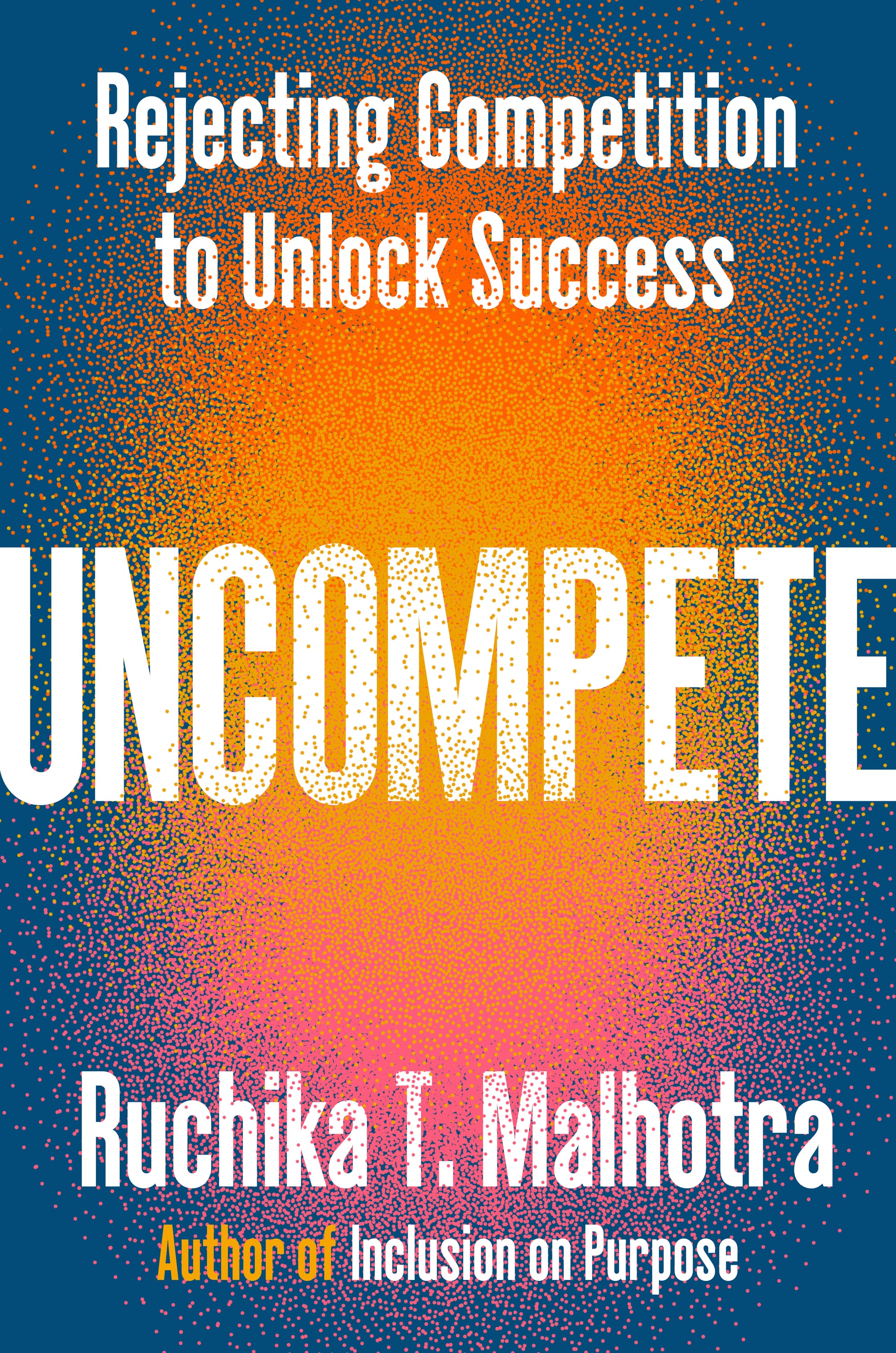The Joy and Success Found in Choosing to “Uncompete”

One of the harshest narratives is the belief that there isn't enough to go around. We’re taught to fight our way to the top and do whatever it takes to get ahead. We believe that competition fuels prosperity. But do we ever stop to second-guess this?
Ruchika T. Malhotra encourages us to reconsider. Our tendency to follow a winner-takes-all mindset actually robs us of more than it gives. It causes division, stress, and trauma. It thwarts us from our potential and joy. And as Malhotra, a revered author and inclusion strategist, further points out, the consequences of competition disproportionately impact women.
Malhotra believes that true good fortune comes from another way: when we chuck the old means of rivalry and instead Uncompete. To "Uncompete," as Malhotra explains in her new book, is to embrace the truth that a happier, more peaceful and prosperous life comes from leaning into collaboration and radical generosity. Her insight offers a path toward a richer work and personal life and a genuinely better world.
But she is quick to recognize that this work is hard, and many may counter by saying that competition is simply part of being human. To that, Malhotra’s insight is compelling—and it offers even more reason to consider this cultural shift.
A CONVERSATION WITH RUCHIKA T. MALHOTRA
What attracted you to explore competition?
One of the reasons why I am so interested in it is that it feels like one of those unspoken rules. In talking to people about competition, especially women, what's curious is that there's this under-the-surface understanding that if you stop and think about it, it's not that good for you. For a lot of people, if I say, 'Hey, I'm writing a book called Uncompete and it's about how competition isn't serving us,' suddenly there's this response of 'Oh my gosh, thank you so much for saying something!' But if I say, 'I'm writing a book about competition,' people will often start with a framing of how competition is just a fact of life. It's only when I tell people that I'm pushing back against those narratives that then there's a sigh of relief.
You're forthcoming about how this subject can be tricky, one reason being that historically, we've been taught that there's only so much to go around and we should compete for our slice of the pie. Will you unpack this scarcity and the fear it induces?
What is tricky is that scarcity is all around us in the system—except when you peel back the layers, you realize that scarcity actually isn't all around us. I list stats for this in the book. For example, we could certainly solve food insecurity in this country if we had the will to do so. So, this is tricky because fear and scarcity are conditioned into our system in so many ways. We're taught that there can only be one promotion. There can only be one CEO. There can only be one fill-in-the-blank. That scarcity narrative is so pervasive in every facet of our society, from the workplace to the home. And it could be anything: You get this car, but your neighbor gets a better car. Or we see it in how we've normalized huge wealth inequality in this country. That ranking and scarcity myth we've been taught is, to some extent, true. So, I can understand why people feel fear that they'll miss out if they don't do more; it's because we've been shown that's the way. But again, if you peel back the layers and look at, for instance, more equitable pay, better distribution of wealth, and investment into creating safer communities, then people won't have to live with the scarcity mentality all the time.
So, I want to say that it's a both-and. That fear is valid, and yet we have a choice—especially as a society, as we face these poly crises around the world—to come together collectively and say we're not going to be governed by this anymore.
What if someone were to say that competition is simply in our nature?
There's such good science that shows what has allowed us to thrive as a species for as long as we have is our ability to radically collaborate. We're really good at building communities and societies. This is why we live in the modern world. But one difficulty of that, which I write about in the book, is that we're so good at collaborating with each other that sometimes we collaborate against an imagined other. That is why, when we see modern prejudice —ranking people against each other and saying 'this person's the enemy' or 'this person doesn't fit in with us' — we can be very good at collaborating to say, 'This person or group is the other.' So that's something we have to be very careful about, and we're seeing it play out in many ways.
What are the costs of this winner-takes-all competition mentality that we've been taught?
Individually, we're paying a big price for our mental and emotional health. I'm especially interested in this not only as a parent, but also as someone in a community where there are many children in my life. I'm very worried when you look at the research on how much competition, especially winner-takes-all competition, exacerbates anxiety, lack of self-worth, and self-esteem.
At an organizational level, research on psychological safety shows that working in an environment where you feel your team has your back is one of the most important ways to drive growth, productivity, and innovation. And yet, in these hyper-competitive environments where you don't feel your team has your back and you feel that you must have your sharp elbows out, that can create a terrible environment and impact innovation and growth.
At a societal level, we must look at the environmental costs of new technologies being built because there is such competition. One of the best books I've read on this is The Empire of AI by Karen Hao. She writes that for many early builders of AI tools, it began with a more collaborative approach to problem-solving. But as soon as they started realizing you could make so much money off these tools if you were the first and the fastest, they pushed for impossible growth. Now there's one AI organization that [will soon] use as much power as it takes to power New York City.
The other important aspect is how competition shows up in every part of our lives, from our workplaces to our homes to our interpersonal relationships.
It's everywhere. One of my favorite movies I watched this year was The Roses, a satirical comedy. Benedict Cumberbatch and Olivia Coleman are a married couple who become rivals because her career takes off and his career sort of tanks. The resentment builds, and they start hating each other. It's funny and satirical, but it shows so much about competition and rivalry, and how it's in our closest relationships—our spouses, our friends, our siblings.
You illuminate another way. What does it mean to "Uncompete"?
At its essence, Uncompete is about being very intentional about rejecting the idea that you have to compete all the time and that every situation is zero-sum. It's believing in the power of abundance and a collective community where truly everyone belongs and can thrive. That is the big-picture version of it. Some of the most powerful ways I've seen it in my own life are around building a strong, abundant community—and that takes attention because of competition, hierarchies, and the way things are set up. We can [find ourselves] in community with people who sometimes bring out the worst in us and make us feel competitive. As a South Asian woman, I look back on a lot of my earlier friendships where there was bullying and not having each other's backs, but that was seen as the norm. Community building with intention is both incredibly hard and incredibly rewarding when you're intentional about it.
So, it's about community and solidarity—and solidarity really means showing up for people who have different struggles than you. I write about the importance of as a non-Black woman showing up for Black women and trying to create solidarity and community there. I don't want to be a woman who tells other women to be nicer to others. That's not what this book is about. This book is about how you can invest in and show up in the world, and how you can create a world that maybe you haven't seen. And in thinking again about the polycrises we're dealing with, it's about: How can you plant seeds for a tree whose shade you may never get to sit under? I'm hopeful that in 30, 40, 50 years, we won't need to be having this conversation anymore.
Where can someone begin to adopt an 'Uncompete' mindset? What is one step they can take this week?
The most important part of this is noticing. When I started writing this book, it was just an idea I was interested in. But once I started doing the research, I couldn't unsee it. Competition is everywhere. So, my advice is to start with noticing. Notice where competition, comparison, or envy—which all stem from the same competitive behaviors—show up in your life. Notice where it shows up in your conversations. You could see it when you drop off your kids at school, and people are talking about the 50 enrichment activities [their kids are taking] to help them get into college. Or you could be in a room with a work colleague and feel annoyed that they got the report done early. Start taking notice and understanding how it shows up in your daily life. And if you can, take notes. Write it down in a journal to be mindful of how it's showing up.
A principle of “Uncompete” is to employ radical generosity. What is radical generosity?
This is the concept that has the most power for change. At its core, radical generosity is the idea that you give without expecting return—especially without expecting return from the person you gave to. It's understanding that it is not quid pro quo; that I did this for A, and therefore A is going to do this back for me. Radical generosity is what my friend Aiko Bethea calls moving away from transactional to relational. It is about doing something because it relates to the world I want to create and see. And it's also about knowing that there may be people who take advantage of that, which is why radical generosity must also be to yourself. It is radical generosity for you to say to yourself, 'Okay, I did that for someone and they didn't behave in a way that was kind or made me feel valued, so boundary set.'
I think radical generosity, at scale, could really make a difference. I see it in communities of women, and especially in communities of Black women that I've been lucky to be invited to. You see that when you've been left out of the system, you have to get creative about making the change you want, and the only way you're going to do that is with radical generosity, and in collaboration and community with each other.
What is one practice that helps you rise above all the noise and keep your Uncompete tank full?
I am so lucky to have an amazing community of women around me, all over the world. So sometimes it can be sending a voice note or saying, 'let's meet for lunch.' It's about staying connected. And I also love practicing yoga. I did my yoga teacher training last year, and one of the most special things for me was that I didn't walk away knowing how to do a handstand. I still can't. I started with a bit of a competitive mindset, thinking, "I'm doing this so I can get really good at my practice and maybe work towards a handstand or whatever." But after completing the 200-plus hours, what was really special was recognizing that even if I lay down the entire time while someone next to me is doing a handstand, I am just as worthy of being in the room. That was very, very powerful.
That underscores another part of this: How we must give ourselves and each other more grace.
That's the revolution. What's core to this idea of Uncompetition is that you can't truly get to a place of peace without fully being in your self-worth. Only from true self-worth can you stop competing with other people, stop comparing yourself with other people, get out of that scarcity mentality, and be radically generous.

You can learn more about Ruchika T. Malhotra here.
Please note that we may receive affiliate commissions from the sales of linked products.



